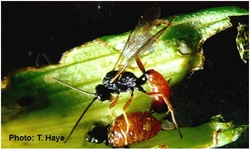
Today we submitted a petition to release a second biological control agent, the wasp Lemophagus errabundus, to control the lily leaf beetle. Like Tetrastichus setifer, profiled on the Biological Control page of this site, Lemophagus errabundus is a non-stinging parasitic wasp that is native to Europe. In Europe, L. errabundus attacks the beetle earlier in the season than T. setifer, so we hope it will prove to be an effective complement to our first agent.
Biological control, which uses natural enemies to combat pest species, is generally considered to be an environmentally friendly way to control pests. However, many people are justifiably wary of introducing one exotic species to control another, given a few high-profile biological control disasters—think cane toads in Australia—dating from an earlier time when biological control was virtually unregulated. Since the 1900’s, however, biological control introductions in Canada have been regulated by the Canadian Food Inspection Agency (CFIA) and potential agents are now carefully scrutinized. Before we can import L. errabundus and release it, our petition will be read by a panel of experts, who will consider whether there is an unacceptable risk that the agent will attack non-target host species or have other unintended impacts. In an extensive array of tests in which L. errabundus was offered a variety of non-target species to attack, it parasitized only the lily leaf beetle and two closely related European lily beetles. Other, more-distant relatives of the lily beetle were not accepted as hosts by the wasp. Thus, the wasp appears to pose minimal risk to native North American beetles.
Lemophagus errabundus has been released in the US and is successfully established in Massachusetts and Rhode Island, where it is contributing to lily beetle control along with Tetrastichus setifer. I’ll post an update when we have news on the status of our petition.
Biological control, which uses natural enemies to combat pest species, is generally considered to be an environmentally friendly way to control pests. However, many people are justifiably wary of introducing one exotic species to control another, given a few high-profile biological control disasters—think cane toads in Australia—dating from an earlier time when biological control was virtually unregulated. Since the 1900’s, however, biological control introductions in Canada have been regulated by the Canadian Food Inspection Agency (CFIA) and potential agents are now carefully scrutinized. Before we can import L. errabundus and release it, our petition will be read by a panel of experts, who will consider whether there is an unacceptable risk that the agent will attack non-target host species or have other unintended impacts. In an extensive array of tests in which L. errabundus was offered a variety of non-target species to attack, it parasitized only the lily leaf beetle and two closely related European lily beetles. Other, more-distant relatives of the lily beetle were not accepted as hosts by the wasp. Thus, the wasp appears to pose minimal risk to native North American beetles.
Lemophagus errabundus has been released in the US and is successfully established in Massachusetts and Rhode Island, where it is contributing to lily beetle control along with Tetrastichus setifer. I’ll post an update when we have news on the status of our petition.
 RSS Feed
RSS Feed
